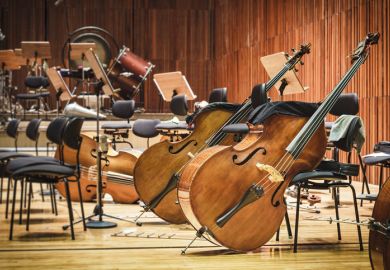Cathedrals and college chapels still occasionally echo to his Service in B flat ; a vigorous soloist will sometimes give us Drake's Drum or The Old Superb ; and there is always that magically poetic part-song The Blue Bird . But his ten operas - some of them unpublished and unperformed - have never really established themselves. The Irish Rhapsodies are rarely heard, and the seven symphonies are not often revived either. A fading image remains of a colourful personality who was a remarkable teacher and a busy conductor, deeply involved in the musical life of this country, a leading figure in that somewhat questionable phenomenon known as the English musical renaissance.
Charles Villiers Stanford is very much the study of a public life, and Jeremy Dibble's careful and detailed pages at first suggest the discretion of an authorised biography, compiled as it were under the eagle eye of some minatory composer's widow. Of course this is not so, but there are reasons for the impression. Stanford never kept a diary; and his 1914 autobiography suppresses (we are told) much of a personal nature.
Nevertheless the reprinted extracts from the latter suggest the vivid quality of the writing would make it well worth reading for its own sake.
Two of the main themes of Stanford's life date from his childhood in well-to-do Protestant-ascendancy Dublin. Frequent presence in organ lofts of the two cathedrals awoke an early interest in church music that was to be amply fulfilled in later life. Likewise, visits of touring opera companies kindled a passion for writing opera that was to be lifelong but less successful. Scholarships then took him to Cambridge, where he soon became organist of Trinity College. Success continued: he was professor of music at Cambridge by the time he was 35. Meanwhile, the Royal College of Music had been founded, and in 1883 Stanford was appointed a member of its staff. An extraordinary balancing act between the fens and South Kensington, both of which became power bases for him, went on for nearly a decade. The most conspicuous achievement of his Cambridge years were the honorary degrees conferred on Bruch, Saint-Sa ns, Boito, Tchaikovsky and Grieg in 1893. His lasting legacy to South Kensington was the number and quality of composition pupils who went on to make reputations for themselves: Vaughan Williams, Frank Bridge and Holst head the list.
His public activities multiplied. He became conductor of the Bach Choir. He was active in Leeds with the Philharmonic Society and the Triennial Festival. He worked hard, but in vain, to get a National Opera established. He campaigned on copyright and music-publishing issues. And all this time he was an enormously prolific composer who wrote very quickly. His opus numbers were eventually to reach 191, and he left behind a dozen unpublished scores. But by the turn of the century - and before he received his knighthood - things had begun to unravel. His operatic career had already suffered a false start and never thereafter (with the exception of the success of Shamus O'Brien ) got off the ground. Younger men, particularly Elgar, overtook him. He became conscious of slights and began to quarrel more seriously with colleagues and friends. Finally the outbreak of war in 1914 shattered the Anglo-German culture that had formed and sustained his art. Worst of all, when in 1918, and after years of ill-health, Hubert Parry died, Stanford was passed over as his successor to the directorship of the RCM: Hugh Allen got the job.
Schumann had been his first musical love, but Brahms dominated his composing life. Indeed the Cambridge University Musical Society had, under Stanford's direction, rather excitingly become for some years the main conduit through which the latest pieces of Brahms flowed into this country. But Stanford had also made the pilgrimage to Bayreuth, and later was to confess to a liking for Parsifal . Like generations of middle-of-the-road English musicians after him, it was the Wagner of Die Meistersinger with which he felt really at home. From this it was a short step to unreserved enthusiasm for Verdi's Otello and Falstaff .
But there his taste stopped. Despite conducting individual works by both composers, Richard Strauss and Debussy proved for him to be a bridge too far. His real feelings had already been voiced in 1908 with his Ode to Discord: A Chimerical Bombination in Four Bursts - about as funny, one supposes, as most musical jokes are. Even before war broke out, he was eager to condemn the Strauss-Reger generation of German composers as part of the German war machine. He made one exception - Humperdinck. As for Schoenberg, Stravinsky, Bart"k, Ravel, there is not a single mention.
The word that most frequently recurs in discussion of his character is "irascible", which, after all, is only the Latin for "bad-tempered". For those immune to his stage-Irish charm he must have been highly irritating: but his capacity for resentment and for quarrelling with his closest friends made him intolerable. Stanford's way of teaching composition seems to us very rough and ready and not without a touch of sadism. But he did hold out for high standards and ideals of rather conventional perfection.
And his bullying methods ensured that his more strong-minded pupils had something formidable to react against. In this way the English musical renaissance was born.
Dibble has cleverly inserted very adequate descriptions of the music into his biographical narrative: there are synopses of the operas and there are many music examples. And without making any excessive claims for his subject, the last three pages of his book eloquently sum up the case for Stanford.
Hugh Wood is a composer who was formerly lecturer in music, University of Cambridge.
Charles Villiers Stanford: Man and Musician
Author - Jeremy Dibble
ISBN - 0 19 816383 5
Publisher - Oxford University Press
Price - £65.00
Pages - 535
Register to continue
Why register?
- Registration is free and only takes a moment
- Once registered, you can read 3 articles a month
- Sign up for our newsletter
Subscribe
Or subscribe for unlimited access to:
- Unlimited access to news, views, insights & reviews
- Digital editions
- Digital access to THE’s university and college rankings analysis
Already registered or a current subscriber?



